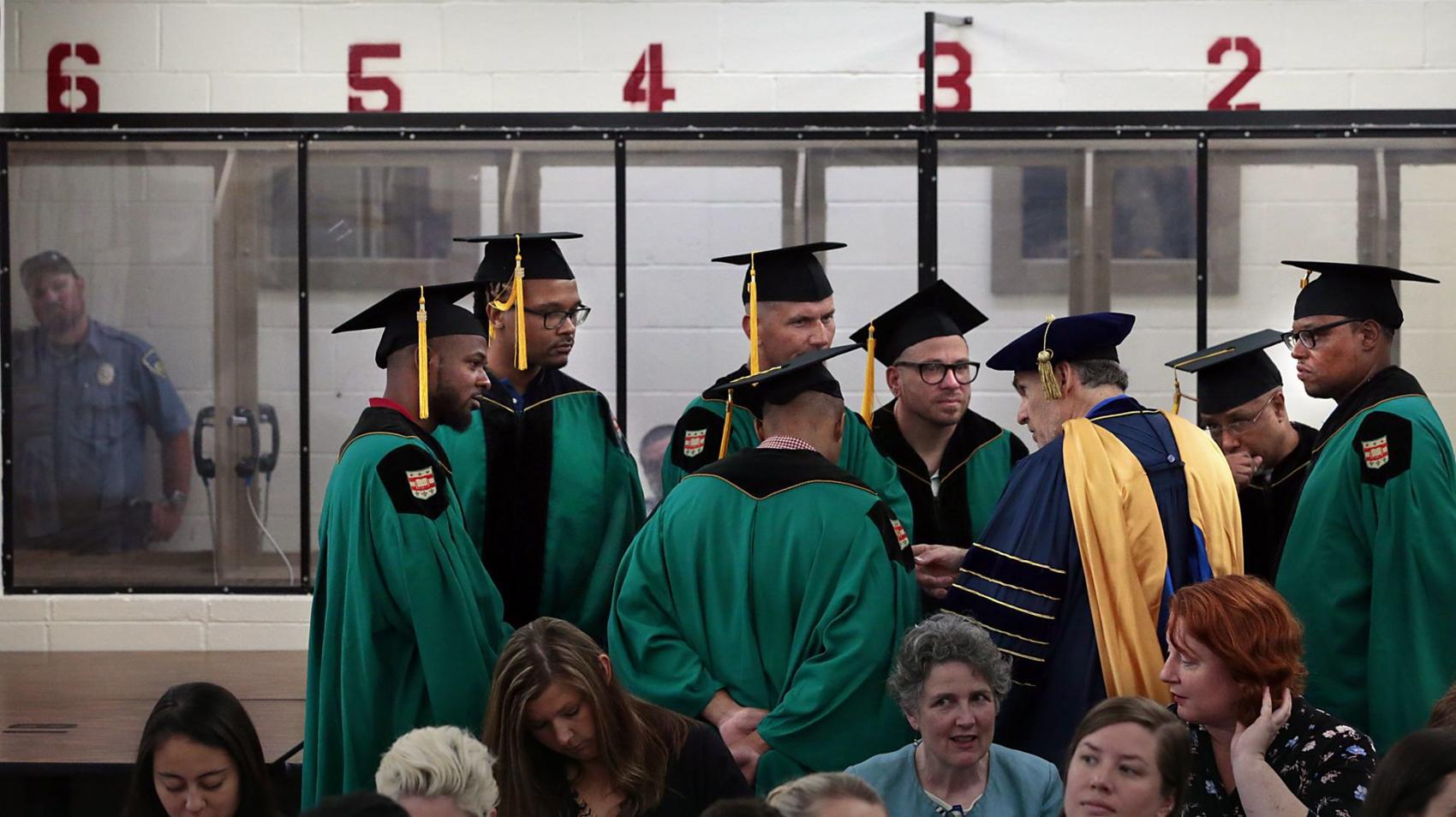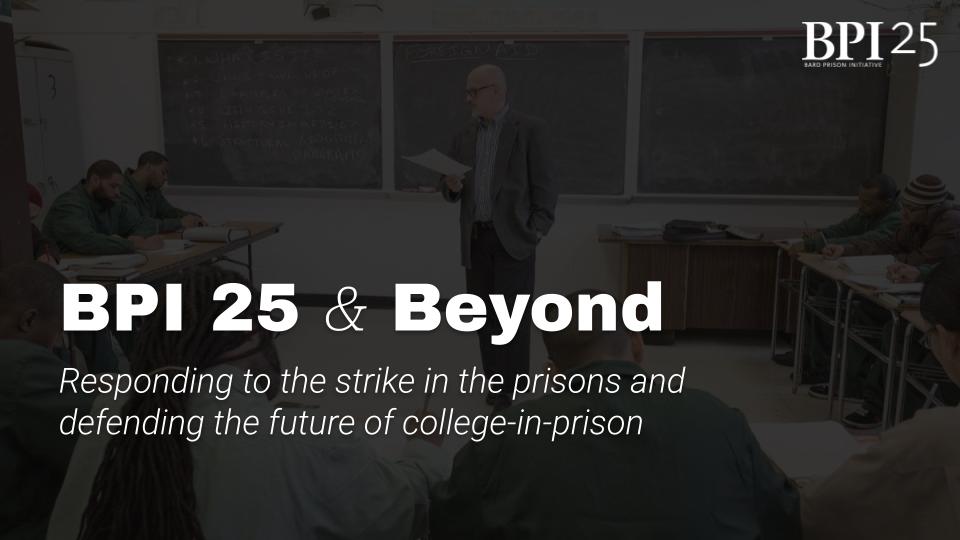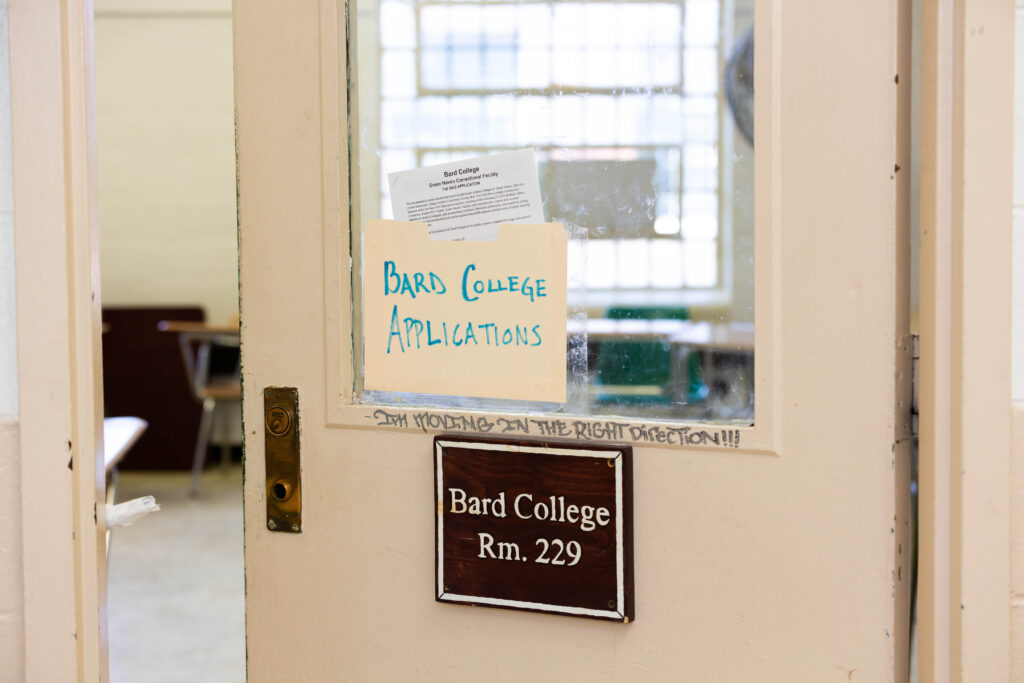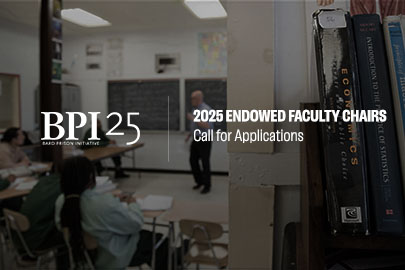Faculty at Washington University in St. Louis worked together with BPI to design and launch the Washington University Prison Education Project (PEP), which joined the Consortium in 2014. In 2019, PEP students celebrated the program’s first graduation with the ten students earning Associates degrees from the University of Washington.
The graduation ceremony was like any other — tearful family members, caps and gowns, “Pomp and Circumstance” — only with added security.
The first 10 graduates of the Washington University Prison Education Project received diplomas Wednesday in the visiting room at the Missouri Eastern Correctional Center state prison for men.
The students, all convicted of felonies, earned associate degrees by completing 60 credits in courses taught by Washington U. professors. They take two to four classes each semester, all for free. Course offerings this spring included Chinese Civilization, Introduction to Macroeconomics and Greek Mythology.
“We’ve created this liberal arts environment in the middle of a prison,” said Robert Henke, comparative literature professor and director of the program. “You get your books and it’s Homer’s Odyssey and you start talking about the text. You’re the professor and they’re not criminals, they’re not inmates, they’re college students.”

Graduates of Washington University’s Prison Education Project speak with its director, Robert K. Henke, in front of the visitation bays at the Missouri Eastern Correctional Center in Pacific before ten inmates received associate degrees on Wednesday, May 22, 2019. Photo by Robert Cohen, [email protected].
About 30 prisoners are enrolled for the summer session where they can study religion, calculus or ethnography. Some 50 to 60 inmates apply each year for the coveted 10 open spots in the program. Applicants must have a high school diploma or equivalent, take an exam and write a personal essay. The students are relieved of prison work duties while enrolled.
Washington U.’s “Pacific campus,” as it’s known, includes a computer room and study hall that hosts a speakers’ series, reading group and tutoring.
The program helps the prisoners feel less marginalized and more like contributing members of society, said graduate Kareem Martin of St. Louis.
“It awakened something in me that needed to be awakened,” he said.
Classes are also offered to prison staff, which improves relationships by providing a shared goal with the prisoners, said Emily Haslag, the facility’s activity director.

Inmate Larry Marshall hangs out with his nephew D’Andre Carson, 16, after graduating with the first class of Washington University’s Prison Education Project at the Missouri Eastern Correctional Center in Pacific on Wednesday, May 22, 2019. Ten men received associate degrees in the commencement held in the prison’s visitation room. Photo by Robert Cohen, [email protected].
The project is one of about 200 sponsored by universities at prisons nationwide. St. Louis University’s Prison Program launched in 2008 at the corrections facility in Bonne Terre and now enrolls 10 students and staff members each year for work toward an associate’s degree. None of its graduates have returned to prison.
Stanley Andrisse, an endocrinologist and assistant professor at Howard University, gave the commencement address. Andrisse, of Ferguson, has three felony convictions and was sentenced to 10 years in prison where a mentor from SLU convinced him to pursue his education.
“You have a piece of paper that will open doors that you never imagined would be opened,” Andrisse told the graduates. “Education is transformative. Use it to rewrite your story.”
Andrisse runs the From Prison Cells to PhD organization and said it was a full-circle experience to return to a Missouri prison as a professional guest speaker.
The Washington U. program is primarily funded by the university and is part of the Bard Prison Initiative of 11 U.S. colleges. It is administered by the school’s University College continuing education division.

Inmate Harvey Galler is greeted by instructor Victoria Thomas as the first graduates of Washington University’s Prison Education Project received their associate degrees at the Missouri Eastern Correctional Center in Pacific on Wednesday, May 22, 2019. Photo by Robert Cohen, [email protected].
“There’s something at stake for these students in the prison,” he said. “They work really hard under sometimes not perfect conditions. It’s not the quietest place in the world.”
The graduation ceremony paid tribute to Maggie Garb, one of the founders of the prison education program. Garb, a Washington University history professor, died of cancer last year.
Graduate Torey Adams said he appreciated that the courses were not watered down for the prisoners.
“My papers always looked like red coloring books when you were done editing them,” Adams wrote in a letter to Garb after her death. “It was through you that we knew that Wash. U. did not come to change us, brainwash us, but on the contrary to accept us as we are, but still make us better in the process.”

Inmate Jimar Johnson (third from left) joins other graduates as they enjoy a moment during the first class graduation of Washington University’s Prison Education Project at the Missouri Eastern Correctional Center in Pacific on Wednesday, May 22, 2019. Ten inmates received associate degrees. Photo by Robert Cohen, [email protected].
Another of her students, Danien Cobb, gave a speech at the ceremony about Garb’s influence on the prisoners’ lives, taking them from “society’s outcasts to mighty men” capable of great achievement.
Cobb expects to complete his associate’s degree next spring while continuing to serve a 20-year sentence for armed robbery. Because of his education, Cobb said, he has been “freed to dream.”



